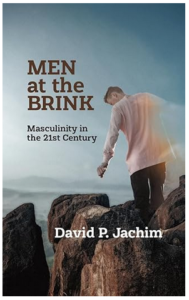Table of Contents
A Review of Men at the Brink, Masculinity in the 21st Century
At Men’s Health Network, we continuously seek to highlight conversations that matter—particularly those that affect the well-being and perception of men in society.
One such conversation is masculinity itself: its past, present, and evolving future.
Dr. David P. Jachim’s new book, Men at the Brink, Masculinity in the 21st Century, takes an in-depth look at these issues, tackling the complex interplay between history, mental health, and cultural narratives surrounding masculinity today.
The Foundations of Masculinity
Dr. Jachim approaches masculinity from multiple angles, weaving together mythology, psychology, and sociocultural trends. His book examines the classical foundations of masculinity, exploring historical and mythical depictions of the male identity. These images, often representing strength, leadership, and resilience, have long shaped the expectations placed on men.
However, as Jachim points out, the perception of masculinity has undergone significant transformations over the years.
As he explores the roots of masculinity, Jachim sheds light on how early societal structures shaped male roles. He argues that, while traditional masculinity has often been equated with stoicism and dominance, its core essence has always been more nuanced, encompassing duty, mentorship, and emotional strength.
The Role of Mental Health in Masculinity
One of the most compelling aspects of Men at the Brink is its critique of how masculinity is treated in mental health research. The book highlights the skewed lens through which men’s psychological struggles are often viewed, noting that contemporary mental health discussions frequently pathologize masculinity rather than seek to understand it.
Jachim observes that many psychological frameworks have either ignored male-specific mental health needs or dismissed them as symptoms of “toxic masculinity.” This perspective, he argues, creates barriers for men seeking help, as they may feel alienated by a system that fails to validate their experiences.
“This remarkable book explores the early roots of the masculine character, the skewed view of the masculine in mental health research, as well as the impact of present-day taglines such as ‘patriarchy’ and ‘toxic masculinity’.”
By incorporating clinical vignettes, Jachim illustrates how these biases manifest in real-world therapy settings. He emphasizes the importance of providing men with mental health support that does not undermine their sense of self but instead helps them navigate their emotions within the framework of their masculinity.
Masculinity in a Changing Cultural Landscape
Jachim doesn’t shy away from controversial topics, such as the impact of cultural narratives on masculinity. He examines how modern discourse—particularly around terms like “patriarchy” and “toxic masculinity”—has shaped public perceptions of men. While acknowledging that aspects of traditional masculinity can be harmful, he argues that the broad application of these terms often leads to unfair generalizations that dismiss the struggles men face.
This part of the book is particularly relevant in today’s cultural climate, where masculinity is frequently debated in political, academic, and social spheres. Jachim warns that reducing masculinity to a monolithic concept risk overlooking the diversity of male experiences. Instead, he advocates for a more balanced approach that recognizes both the strengths and challenges of masculinity in the modern world.
“In many ways, this book is a comprehensive assessment of how men are viewed, not only in the consulting room but also in the culture at large. It is a practical guide to understanding the dilemmas that men face today, and it provides pathways for helping men reach their full gendered potential.”
The Future of Masculinity: A Call for Empathy and Understanding
Ultimately, Men at the Brink serves as both an exploration and a call to action. Jachim encourages readers, whether mental health professionals or the general public—to adopt a more empathetic and nuanced understanding of masculinity. He argues that men should not be forced to abandon their identity but rather be supported in developing healthier expressions of masculinity that align with their personal and societal roles.
This message aligns closely with the mission of Men’s Health Network, which advocates for a comprehensive and compassionate approach to men’s well-being. Recognizing the unique challenges that men face—ranging from mental health struggles to societal expectations—allows for more effective support systems that empower men rather than alienate them.
Why This Book Matters
For those invested in the men’s health movement, Men at the Brink provides a crucial perspective on the evolving discourse around masculinity. It bridges the gap between history, mental health, and cultural analysis, offering practical insights for those who want to better understand the challenges facing men today.
Dr. Jachim’s work underscores the importance of fostering discussions that move beyond blame and instead focus on constructive solutions. Whether you’re a mental health professional, an advocate for men’s well-being, or simply someone interested in the topic, this book serves as an invaluable resource.
At Men’s Health Network, we believe that conversations like these are essential for progress. By promoting literature that encourages thoughtful discussion and critical analysis, we hope to continue fostering a more informed and supportive approach to men’s health and identity.
If you’re interested in learning more about Men at the Brink, Masculinity in the 21st Century, we highly recommend adding it to your reading list. Let’s continue the conversation—because understanding masculinity in all its complexities is key to building a healthier future for all men.

About David Jachim
David Jachim, PhD is a board-certified psychoanalyst in Seattle, Washington. He has published articles and essays in the areas of mental health treatment, mental health training and political aspects of mental health.


